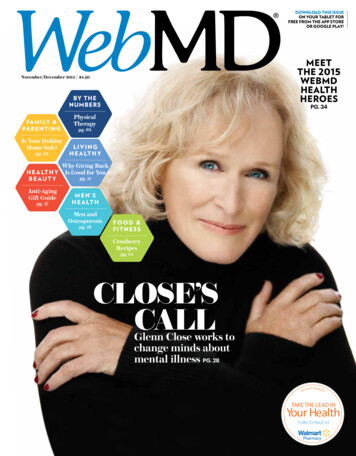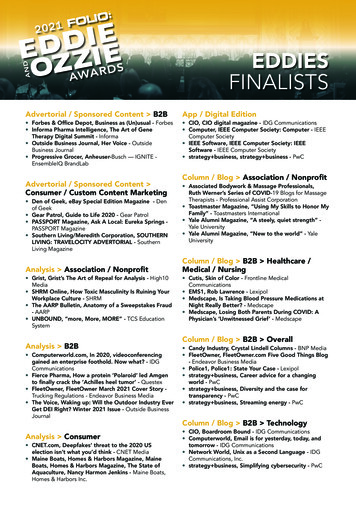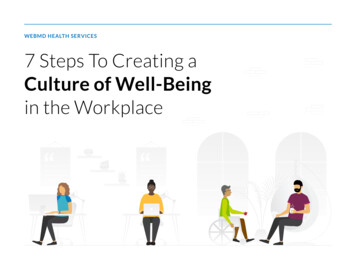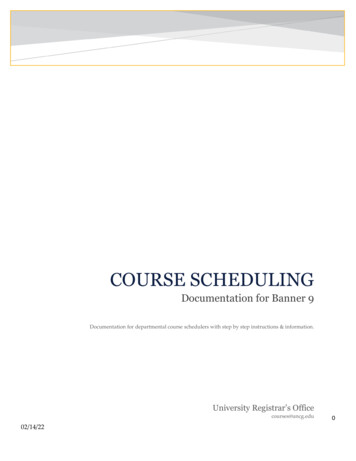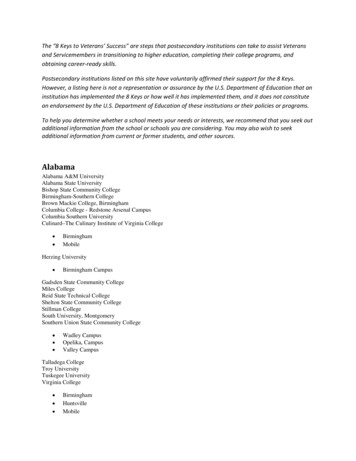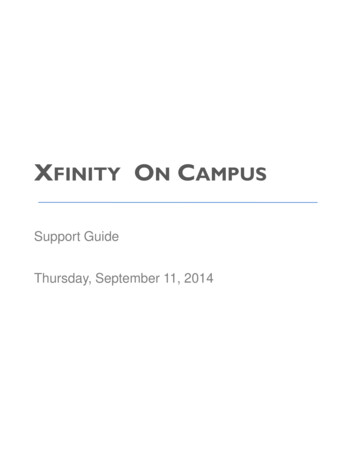
Transcription
download this issueon your ipad for freefrom the app store!Fall 2013Campush otto p i c sTa k efiveExpert StressBusting Tipspg. 4News YouCan Usepg. 3S t u dysmartsSay Goodbye toAll-Nighterspg. 6H e a lt h ye at sH e a lt h yt r av e lBeat theFreshman 15pg. 13Study-AbroadStrategiespg. 11GreaterGoodVampire Diaries’ bad guyIan Somerhalder sinks his teethinto big issues off-set pg. 8
The Affordable Care ActWill Affect You1Learn theBasics2UnderstandCosts3Know YourState Plan4Get Readyto Enrollwill make it easier to choose the besthealth insurance coverage for you and your family.If you want to learn more or follow the latest news, come visit us at WebMD.com/MyHealthcare.
Campusnews & viewsHOT TOPICS!on the cover: Marc Batiste/Corbis outline. clockwise from top left: Trinette Reed/Getty Images; Joff Lee/Getty Images; Nicholas Eveleigh/Getty Images; Ojo Images/Glow ImagesWhat you need to know right nowBad Boost?Ink thinkTemporary tattoos are atrademark of beach trips.But the ugly side effects ofblack henna—which caninclude redness, rawness,and blisters—may outlast the fun. Pure henna,which is reddish-brown,is safe. But black henna,often used for temporarytattoos, can contain PPD(p-phenylenediamine),an ingredient in hair dyethat’s illegal for use in skinproducts. Some statesregulate temporary tattoo artists, but not all do.Depending on where youget one, your temporarytattoo could be risky.Source: FDATrim the FatDietary supplements thatcontain DMAA (dimethylamylamine) may promiseweight loss, muscle building,and performance enhancement, but the FDA says thestimulant could raise bloodpressure and lead to heartproblems. The FDA is moving to remove the stimulantfrom stores. Meanwhile,check labels for DMAA.You’ve heard saturated fat isn’t good for yourheart, but it could affect your mood and howmuch exercise you get, too. In a recent study,young adults spent three weeks on a diet whosemain fat source was an oil high in saturatedfat (like that found in red meat and eggs).Then they ate those same foods for anotherthree weeks, only this time with an oil high inmonounsaturated fat (like that found in nutsand avocados). While on the monounsaturated fat diet, those in the study were moreactive, burned more calories while at rest, andreported less anger.percentage ofamericans ages19 to 25 whohave no healthinsuranceSource: American Journal of Clinical NutritionSource: CDCIn & OutSource: FDA26.3%If your mind wanders during tests, focus on yourbreathing. In a study, college students who completed eight sessions of mindfulness meditation training reduced mind-wandering during a GRE reading comprehension test and significantlyimproved their scores.Source: Psychological ScienceFA L L 2 0 1 33We b M D . c o m
Campusta k e f i v eDis StressGot five minutes? Recharge with these healthy tipsFive minutes. It may not soundlike much. And you may feel youhardly have one minute, let alone five,when you look at your class schedule.But it can be plenty of time to do justone thing that might make the difference in your whole day. Take five andtry one of these five simple ways toReviewed by Brunilda Nazario, MDWebMD Lead Medical Editorreduce stress, rejuvenate your energy,and improve your mood.Pack a snack. Before you head outin the morning, grab some fruit (like abanana, apple, or grapes) or a healthyprotein snack (like unsalted nuts orlow-fat cheese) on your way to class.When the munchies strike later in theafternoon, you won’t reach for a bag ofchips or a candy bar from the vendingmachine. Besides, you know what theysay about an apple a day.We b M D . c o m4FA L L 2 0 1 3Stretch. You don’t have to be a yogi tobenefit from stretching. Lift your armsabove your head at your desk. Better yet,stretch your legs by walking around yourdorm building once or twice. Stretchingcan improve your circulation and flexibility, and helps ease the tight musclesthat accompany stress.Say om. Try meditation and deepbreathing to relax and turn your mindoff. You don’t need any equipment topractice meditation. Find a comfortableBloom Image/Getty ImagesBy Jennifer Soong
Take a deep breath and read a top article,Blissing Out: 10 Relaxation Techniquesto Reduce Stress on the Spot.composition in a chair or on the floor. Focus onyour breathing, bringing your attentionback to it whenever your mind wanders.Meditating daily, even for just a fewminutes, helps fight depression andease stress.Write it down. Take a minute everyday to write down several things you’rethankful for, whether they’re big orsmall. It’s easy to vent about crabbyprofessors or that noisy neighbor downthe hall, but complaining brings negative energy along with it. Being thankful for what you have helps you appreciate all the positives in your life.Prioritize. It’s easy to feel overwhelmed when you have multipletasks crowding your mind. Make alist and check off each task as youcomplete it. Tackle your most dreadedmust-dos first to avoid the anxietycaused by procrastination. At the endof the day, a list of accomplishmentsis a great visual reminder of how productive you were.Cold FactsWilliam Schaffner, MD, past president of the National Foundationfor Infectious Diseases, tackles the myths and truths aboutcolds and fevers.Feed a cold, starve a fever: myth“There’s nothing to this ancient‘wisdom,’ ” Schaffner says. In fact,some supposed sickness sagesrecommend it the other way around:Starve a cold and feed a fever. Eitherway, it’s a myth.Vitamin C can help cut acold short: mythSorry, but research does not supportthe idea that popping vitamin C willshorten the duration of a cold.Drink plenty of fluids if you have acold or the flu: truthSchaffner recommends drinking lotsof fluids (of the nonalcoholic variety),because dehydration can makesymptoms worse.Wash your hands after using therestroom and before eating: mythWell, you do want to wash your handsat those times, but Schaffner alsoWhat Will HelpYou Lose Weight?WebMD Food & Fitness PlannerIn just a few clicks, customize a plan to help you reach yourweight and fitness goals. Studies have shown that peoplewho keep a food journal lose twice the weight than thosewho rely on diet and exercise alone.*Best of all, it’s free. So start planning today.*American Journal of Preventive Medicine, August 2008recommends washing your handsafter coming inside from being outin the world, where you likely cameinto contact with lots of potentiallyinfected people and things.Take extra zinc to shorten theduration of a cold: mythSave your money, says Schaffner.“The jury is in on zinc: It does nothelp,” he says. “There are now anumber of studies that show that.”Get moving to boost your immunesystem: truthAccording to Schaffner, regularexercise seems to tone upnot only your body, butalso your immune system.“It doesn’t matter whatkind,” he says. “Walking,jogging, running, liftingweights, playing volleyball—anythingyou can do several times per week.”—Linda Formichelli
Campusstudy smart sTake NotePrep SchoolOur experts offerthese tips toimprove your nextstudy session.Say goodbye to all-nighters!Learn how to study smarter, not longerTest yourself.Most textbooks havepractice questionsat the end of eachchapter. Use them!“When you try toretrieve informationfrom your memory,you’ll learn far morethan [when you’re]just rereadinginformation,” saysNate Kornell, PhD,assistant professor ofpsychology at WilliamsCollege. “You’llalso identify gapsin your knowledge,pinpointing what youknow and what youneed to study more.”By Colleen OakleyIt’s exam time. You pore over your books for hours before the big test, only to get to classand completely space on the material. What the heck happened? Well, for starters, youmay not have studied as much as you thought, says Nate Kornell, PhD, assistant professor ofpsychology at Williams College. “A lot of college students often think they’re studying whenthey’re not,” he says. “Let’s say you spend an hour in front of the computer, but you have IMon and YouTube running and your music blaring. You probably spent only 20 minutes studying, but you think you studied for an hour.”And it’s not just distractions that slow you down. If you’re just rereading your notes andbooks, you’re probably not retaining a lot of information. A recent study found that studentsremember just 10% of their reading material.So how do you study more effectively? Put down that coffee cup and pull up a chair. It’s timeto gain some knowledge.Log off Facebook. It might seem like a no-brainer, but a recent study from Ohio StateUniversity found that college students who use the social networking site spend less timeWe b M D . c o m6FA L L 2 0 1 3Pretend you haveto teach. Studieshave found thatpeople who learnwith the intention ofhaving to teach thatmaterial to someoneelse have far higherretention rates. “Whenyou think you haveto teach something,you approach thematerial differently,”says Kornell. “Youhave to make sure youunderstand it so thatyou can explain ifto another person,which guaranteesyou won’t just scratchthe surface.”Colin Gray/Getty ImagesSum up.After reading apassage or your notes,try to summarize thematerial in your ownwords. “This forcesyou to synthesizethe information andmake sense of it.You’ll learn it, ratherthan just memorizingit,” he says.
take a 3-minute surveyand be entered for achance to win anAppleWhat’s your bestbrain-boostingtip? Tell us at@WebMD#webmdmagstudying and have lower grade pointaverages than students who don’t. “Itdoesn’t mean that using Facebook necessarily causes you to get bad grades,”says Kornell, “but it is another distraction, a time-suck that you could bespending studying.”Change locations. You may thinkthe library is the best place to hunkerdown before a big test, but studies showyou will retain more information if youmove around—study one night in yourdorm, go over your notes in the cafeteria at lunch, do flash cards on the busor train.figuring it out, try to squeeze in anafternoon snooze.Space out. In a recent study, students who studied one large stack offlash cards over a four-day period faredbetter on a test than students whobroke the stack into smaller segmentsand studied them all in just one day.What gives? “It’s called the spacingeffect,” says Kornell. “The more cardsyou have in your stack, the more timepasses before you see [one] again.”Though it seems counterintuitive,when something is fresh in your memory, studying it more doesn’t increaseA study found that sleeping for 90 minutesafter learning new information helpsconsolidate it in your long-term memory.iPadfrom WebMDScan This CodeOr Log On Towebmd.com/magazine/campus/surveyand tell us why you read us.download this issueon your ipad for freefrom the app store!Fall 2013Campush otto p i c s“Part of encoding new informationin your brain is connecting it to theenvironment you’re in,” says Kornell.“So when you study the same thingmultiple times in different rooms, you’llconnect it to different external cues,giving you more triggers to retrieve theinformation later on.”But wherever you choose to hit thebooks, make sure it’s a place with fewdistractions—especially if you’re someone who finds it difficult to concentrate.“Coffee shops are probably the worstplace to study,” he says.Take naps. In college, sleep can behard to come by. And while a full nightof zzz’s is crucial for your health andbrain power, studies show naps canbe just as beneficial. A recent Israelistudy found that sleeping for 90 minutes after learning new informationhelps consolidate it in your long-termmemory. Researchers aren’t exactlyclear why this works, but while they’reyour ability to remember it for thelong term. “Studies show you havebetter retention rates when you allowyourself time to forget information andWebMD Logothen relearn it again,” says Kornell. Sorather than cramming the night beforea big exam, study for an hour or two perday leading up to the test.Do jumping jacks. Or push-ups.Or run in place. A University of California, Irvine study found that shortbursts of exercise—as little as six minutes—improve the ability to remember information you just learned.Researchers believe that may bebecause exercise induces the release ofnorepinephrine, a chemical messengerin the brain known to play a strong rolein memory. Just be prepared to explainto the librarian why you’re lungingdown the aisles.Reviewed by Patricia A. Farrell, PhDWebMD Mental Health ExpertNews YouCan Useta k efivepg. 3Expert StressBusting Tipspg. 4s t u dysmartsSay Goodbye toAll-Nighterspg. 6h e a lt h ye at sh e a lt h yt r av e lBeat theFreshman 15pg. 14Study-AbroadStrategiesPRINT CMYK VERSIONpg. 12Bluec 100m 3402GreateryGoodkVampire Diaries’ bad guyIan Somerhalder sinks his teethinto big issues off-set pg. 8Completing the survey will enter youin our sweepstakes for a chance to win a16GB Wi-Fi Enabled Apple iPad withRetina Display (retail value 499).MAGAZINENO PURCHASE NECESSARY. A PURCHASE WILL NOT INCREASE YOUR CHANCES OFWINNING. LEGAL RESIDENTS OF THE 50 UNITED STATES (D.C.) 18 YEARS AND OLDER.VOID WHERE PROHIBITED. Sweepstakes ends 10/9/13. For Official Rules, prize descriptionsand odds disclosure, visit webmd.com/magazine/campus/survey. Sponsor: WebMD, LLC, 1118th Avenue, New York, NY 10011.Blackc 0m0y 0k 100
GoodwillIHe plays a bad guy on screen, butVampire Diaries actor Ian Somerhaldersinks his teeth into bigger issues off-setHuntingIan Somerhalder wants to be the bad guy again. As vampire Damon Salvatore onthe CW’s hit series The Vampire Diaries, his role has evolved over the show’s firstfour seasons. In season five, which airs this fall, he hopes to return to his villainousroots. “In season one, Damon was extremely dangerous, volatile, and unpredictable,” Somerhalder, 34, says as he takes a break from shooting the last few episodes of season four in Atlanta. “I hope to bring that Damon back.”Damon sinks his fangs into throats on TV, but in real life, Somerhalder wants tosave the world. In 2010 he launched his eponymous IS Foundation, which focuseson environmental issues, champions green energy, and fights against animal cruelty (isfoundation.com). “This was an idea that had been percolating for a while,”says Somerhalder, “but the true catalyst, what really pulled the trigger, was theBP oil spill.”For Somerhalder, a Louisiana native who grew up near New Orleans, the 2010disaster in the Gulf of Mexico hit close to home. As massive amounts of oil floodedthe coast, Somerhalder seethed. “It left me feeling helpless, and I don’t ever wantto feel like that again.”Over the past two and a half years, the foundation has supported a successfulcampaign to toughen animal cruelty laws in British Columbia; partnered in theproduction of Blue August, a weeklong TV series on Discovery’s Planet Greennetwork (now the Destination America network) celebrating the diversity of theBy Matt M c MillenPhotograph by Angelos Kritikos/Corbis OutlineWe b M D . c o m8FA L L 2 0 1 3FA L L 2 0 1 39We b M D . c o m
Ian’sInsightsFight stress withexercise. “If you’restressed out andwound up, go fora one-, two-, orthree-mile run andsee what happens.Push your body,and your bodywill produce thechemicals thatmake you feelbetter.”“ocean; created an animal sanctuary for outcastpets; and broken ground on a farm that will showcase sustainable agriculture.Today, Somerhalder says, the foundation has90 crews, representing 24 countries. The vastmajority of these crews are made up of collegeand university students. Last fall, for example,the foundation’s Green Your Thirst campaign,which aims to educate students about theenvironmental impact of bottled water and toencourage them to work toward a bottled-waterfree campus, got under way.The IS Foundation also recently launched acollege advisory board, made up of 15 studentsfrom around the world who will help expandthe foundation’s educational efforts and activism at colleges and universities everywhere.“This is a really cool, globally diverse group ofpeople,” Somerhalder says of the board members, each of whom will serve six-month terms.“Our mission is to empower young adults totake a stand on global issues, to become a forcefor positive change.”Somerhalder’s passion for the planet and allthe creatures on it—including himself—runsdeep. “My health’s wildly important to me,” hesays. “I wouldn’t have the stamina and energyfor 80-hour work weeks without good health.”To stay in shape, Somerhalder likes speed walking, yoga, basketball—anything, really, thatdoesn’t involve a gym and gets him outdoors. Hereads and meditates to relax.And although his on-screen diet is bloodbased, in real life he has a much more humaneand nutritious approach. He loads up his platewith fruits and vegetables, sticks to lean meats,and eats lots of healthy whole grains, like quinoa. And eating right means more than justnutrition. In keeping with his foundation’s mission, he seeks out foods that are produced bysustainable methods and farmed humanely.Doing all this good for himself and the planetkeeps Somerhalder busy offscreen. In his onscreen life, he doesn’t know where the show’swriters will take the story, but, he says, “Damonwas the bad boy, and I miss that guy.”We b M D . c o m10FA L L 2 0 1 3Think positively.“You’ve got tobe really carefulabout what’sgoing on in thatnoggin of yours.Keep it full ofreally positive stuffand that’s whatyou manifest inyour life. I know itsounds clichéd,but it’s true, man,and I’m glad Ilearned that.”Don’t stoplearning. “I’mexcited for peopleto learn more andput more stock inwhat’s happeningwith their world,with their bodies,what they’reputting into it,what they’regetting out of it.”Adam Olszewski/Corbis Outline“Our mission is to empower youngadults to take a stand on global issues,to become a force for positive change.Stay focusedon your health.“You’ve got to bereally committedto it. You’ve gotto plan for it. Andyou’ve got to makeit a habit. You’regoing to get a lotmore out of yourbrain and yourbody if you takecare of both.”
Campush e a l t h y t r av e lCountry RoadsGearing up for a semester abroad? Do yourhomework on staying safe and healthyBy Stephanie WatsonA semester abroad is one of thecoolest parts of college. When elsein your life will you have the time—andthe freedom from responsibilities—totravel for weeks or months on end?But after dreaming about your trip foryears and planning for months, cominghome early because you got sick wouldreally stink. You want to spend yourtime abroad seeing the sights—not thelocal hospital. So treat your trip like youwould a big class project: Do your homework and study up before you leave. Twotop travel health experts help you prepfor health problems you could encounter overseas.Arm yourself. Developing parts ofthe world host diseases you might neverhave heard of—and that you definitelydon’t want to bring home as souvenirs—Call your insurance company beforeyou leave and find out exactly whatit will cover.Anna Bryukhanova/Getty Imagessuch as typhoid and yellow fever. To findout which bugs are booming at yourdestination, check the CDC’s traveler’shealth site or download the CDC’s Yellow Book traveler’s app from iTunes.Visit your campus health clinic to getall of the country’s recommended vaccinations at least a month before youleave. “Vaccines take a little while to setup before they provide you with goodprotection,” says Jeff Hall, MD, director of the University of South Carolinaand Palmetto Health Travel Clinic. Forexample, the hepatitis A vaccine—whichyou might need for travels to Africa orWe b M D . c o m11FA L L 2 0 1 3
Get ready for your big trip with 25 Ways toStay Well Abroad, the top slideshow at theVaccines Health Center.Dana Neely/Getty Images.com.comAsia—takes at least two weeks to fullyprotect you.Make plans. Find out ahead of timewhere to get medical care if you needit. That could be your school’s studenthealth program if you’re on an international campus, or a local clinic. TheInternational Association for MedicalAssistance to Travelers’ website listsdoctors and clinics around the world.Call your insurance company beforeyou leave and find out exactly whatit will cover—from clinic visits for astomach bug to X-rays if you get into askiing mishap—so you don’t get stuckwith a big bill at the end of your trip.If you’re traveling to a developingcountry where medical care is sketchy,it’s a good idea to also have a planthat covers medical evacuation—thatis, the cost of an unexpected flighthome. “For a serious medical illness,the best option is to leave,” says KevinDieckhaus, MD, chief of the Division ofInfectious Diseases at the University ofConnecticut Health Center.Buckle up. The biggest threat tointernationally bound college studentsisn’t disease. “Statistically, the mostlikely cause of a health problem is motorvehicle accidents,” Dieckhaus says. Ifyou can avoid driving in an unfamiliarplace, do it, he suggests. When you ridein a taxi or car, follow the same rule youwould at home—wear your seatbelt.Sleep tight. Crossing time zones canreally wipe you out. As soon as you land,change your watch or check your phonefor your destination’s time. Stick to thelocal time, even if it’s 3 a.m. at homeand you’re dying for some sleep. “If youcan keep yourself awake until it’s timeto fall asleep, it will get you on yournew country’s schedule a little quicker,”advises Hall.You also can take melatonin, a hormone supplement that helps reset yourbody’s sleep-wake cycle, as soon as youReviewed by Michael W. Smith, MDWebMD Chief Medical EditorBag CheckHealth travelexperts KevinDieckhaus, MD,and Jeff Hall, MD,recommend taking amedical kit stockedwith supplies youmight not be ableto find at yourdestination.before you go. Makesure you understandwhen or even if to takethem. Antibiotics willonly help if bacteria arebehind your stomachailment.Your meds Whateverprescription medicinesyou take—from asthmaStomach soothersinhalers to ADHDUp to half of alldrugs—bring enough tointernational visitorslast the entire trip, pluscome down with a case a little extra. Don’t putof traveler’s diarrhea.these in your checkedJust in case you catchbaggage; keep themthis miserable affliction, on you, in case youpack a few stomachand your luggage partremedies—includingways. Also carry anyPepto-Bismol andover-the-counter drugsImodium. Ask youryou might need fordoctor or college health everyday ailments.clinic for a prescriptionfor antibiotics to takeBug spray Malaria isif these meds aren’ta health risk in someenough to relieve yourareas of Africa andother tropical climates.diarrhea, and fill itleave. Keep taking it until you adjust tothe new time zone. To help you get usedto sleeping in your new country, bringyour favorite pillow from home. Andwatch the caffeine and alcohol. Theycan prevent you from getting the restyou need.Don’t drink the water. In Europeand other developed parts of the world,you can pretty much eat and drink whatever you like. “As soon as you get intoFA L L 2 0 1 312We b M D . c o mCheck with your doctoror campus health clinicabout antimalarial drugs(such as chloroquine ordoxycycline) you mayneed to take beforeyou leave. Also, bring agood insect repellentwith the ingredientDEET, which will helpward off the mosquitoesthat carry this deadlyinfection.Accessories Whentraveling to warmclimates, packprotective clothing.Top off every outfitwith a floppy hat,sunglasses, andsunscreen. Good,sturdy shoes are alsoessential. Flip-flopsmight be handy in theairport security line, butthey’re too flimsy forwalking excursions.developing areas, food- and water-borneillnesses become a problem,” Dieckhauswarns. Stick with boiled or bottled water,even for brushing your teeth. And orderyour drinks without ice. Though you’llwant to sample the local cuisine, watchwhat you eat. “The foods that tend to besafest are things that have been cooked.Foods that get you into trouble are thosethat have been washed, but not cooked,”Hall adds.
Campush e a l t h y e at sNumbers Gameward off The “freshman 15” by Keeping these10 foods on handBy Erin O’Donnell“The freshman 15,” orthe 15 pounds thatmany students gain duringtheir first year of college, issomewhat of a tradition—butit doesn’t have to be. Thetrick may be to stock yourdorm room with good-for-youfoods instead of trying to skipmeals altogether (and whocan do that with so manyburger joints around?).Dietitian Lori Clements, RD,LDN, who works withstudents at Temple University in Philadelphia, sharesher top 10 choices, allhealthy, inexpensive, andtasty enough to hold off the2 a.m. pizza binges that packon pounds.Reggie Casagrande/Getty ImagesHot breakfast cerealSkipping breakfast wrecksyour concentration andproblem-solving ability andsets you up to overeat atlunch, Clements says. Thankfully, hot cereals like oatmealare filling and fast, readyafter a minute in a microwave. Look for brands with atleast 5 grams of fiber. Amongits benefits, fiber keeps youfuller longer, she says, “soyou’re not sitting in class anhour later with your stomachgrowling.”Reviewed byHansa Bhargava, MDWebMD Medical EditorWe b M D . c o m13FA L L 2 0 1 3
Check your grocery list for Food FraudsThat Wreck Your Diet, the top slideshow on the Health & Cooking channel.comMicrowave popcornPopcorn rocks when you’recraving crunch. Just optfor a brand that’s light onfat and salt, “not the movietheater triple-butter kind,”Clements says. One ounce oflow-fat microwave popcorncontains just 120 caloriesand 4 grams of filling fiber.Instead of devouring aregular-size bag on yourown (calorie overload!),share with a roomie, or optfor single-serving bags.Milk It’s an easy source ofmuscle-building protein, aswell as calcium and vitamin D, two key bone nutrients. To avoid extra caloriesand fat, choose skim or 1%.And keep a box of dry milkhandy, Clements says. Youcan make a portion at atime, so you’ll always havesome for cereal or oatmeal,even when you can’t make agrocery run.can also satisfy cravings forsweets. As a bonus, “there’salways individual, 6-ounceyogurts on sale,” Clementssays. Greek yogurt is higherin appetite-suppressingprotein.Apples Apples (as well asoranges and bananas) aregreat grab-and-go snacks.Because these fruits provide vitamin C and othernutrients that support theimmune system, they provide some insurance againstcolds and flu, a risk of dormliving, Clements says.Baby carrots An ounceof baby carrots contains77% of your daily requirement of vitamin A, whichprotects vision and supports immune function.Best of all: “When they’reon sale, sometimes babycarrots are just a dollar abag,” Clements says.protein and heart-healthymonounsaturated fats.Spread it on apple slices.Just keep your portion to atablespoon, which is about100 calories, Clements says.Keller & Keller Photography/Getty ImagesSkipping breakfast wrecks yourconcentration and sets you up toovereat at lunch.Salsa It’s a low-caloriealternative to fatty sourcream-based chip dips.It’s also a decent source ofvitamin-rich veggies, whichmany college diets lack. Pairsalsa with whole grain chips,Clements suggests.Hummus Pair those babycarrots with protein- andfiber-rich hummus for abalanced and filling supersnack. Packed with iron,hummus is especially healthyfor college-age women, whooften are iron-deficient.Low-fat yogurt A sourceof filling protein and bonebuilding calcium, yogurtPeanut butter It’s cheap,filling, and doesn’t requirerefrigeration. It’s also full ofFA L L 2 0 1 3Soup When the weatherturns chilly, warm up withsoup. “It’s an easy mealbecause it’s microwaveable,” Clements says. “Andvegetable soup is a good wayto get lots of vegetables.”Buy reduced-sodium versions and skip the 24-caseof ramen noodles, whichcontain too much sodium(in the seasoning packet)and no protein or fiber.Did You Know?One energy drinkcan contain 80 to 500 mgof caffeine, compared with about100 mg in a 5-ounce cup of coffee.14We b M D . c o m
on your ipad for free from the app store! take five Expert Stress-Busting Tips pg. 4 healthy eats Beat the Freshman 15 pg. 13 healthy travel Study-Abroad Strategies pg. 11 hot topics News You Can Use pg. 3 study smarts Say Goodbye to All-Nighters pg. 6 Campus Greater Good Vampire Diaries' bad guy Ian Somerhalder sinks his teeth into big .
